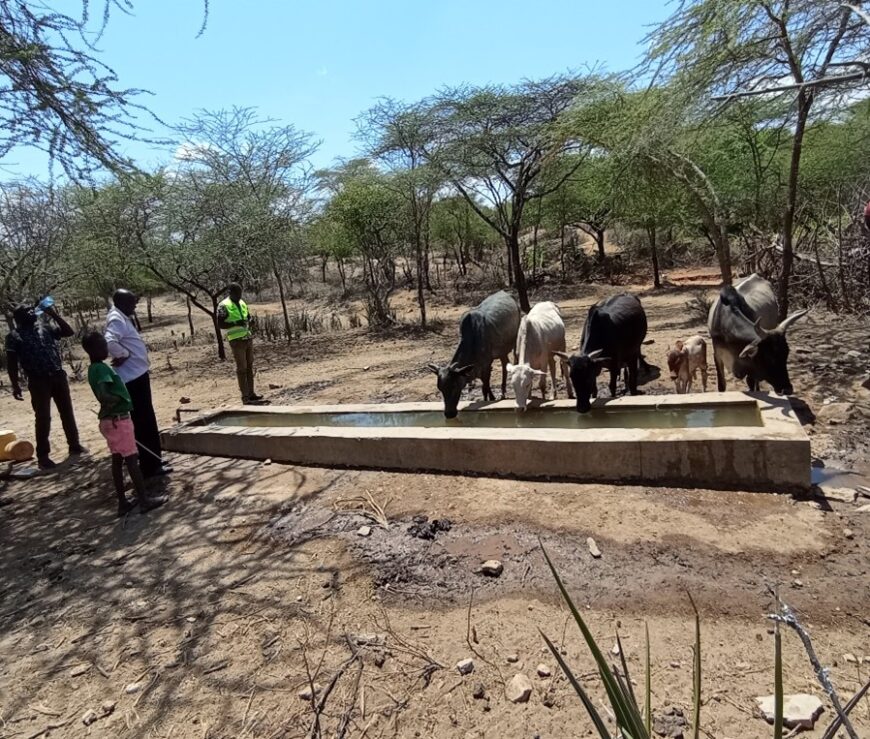In Kenya, ACTED supports access to safe water and sanitation to protect vulnerable populations of West Pokot against the Covid-19.The biting drought and lack of water in Katuda, West Pokot County, meant that a significant number of water points and boreholes needed to be rehabilitated to ensure communities had access to water.
This would also help reduce the spread of the COVID-19 pandemic as well as water borne diseases. That is why ACTED installed a water kiosk in a strategic location in the village. This helped provide an easy access especially for members of the community with disabilities or having trouble walking like the elderly, it is also easier and safer for children and women in the night.
Improving water access to counter the combined effects of drought and Covid-19 in the arid Kenyan lands
As part of the Arid and Semi-Arid Lands of Kenya, the Katuda community is especially confronted to the impact of climate change. Irregular rainfalls and drought are curbing access to water for the people in the area.
The water sources available for the population include unprotected sand dams, water pans and shallow wells. The water from these locations is consumed without being treated thereby exposing the community to water infections and water-borne diseases. In the current context of global health vulnerability, access to clean water and in sufficient qualities is decisive to protect everyone’s health. To remedy sanitation issues, the community needs strengthened knowledge about water safety and sustainable management of water points to compensate the lack of formal structure of water points management, making those communities reliant on the County Water Department services for even minor repairs. Advocating at community level and supporting the establishment of an active multi-sectoral committee to manage the maintenance and rehabilitation of the water points is key for local autonomy and improvement of access to water.
Katuda lacks water since 2019.The borehole, which used to serve more than 2 000 people and thousands of livestock for more than three years broke down due to malfunctioning of the pumping system. With the rehabilitation support program by ACTED, the community can now access safe and clean water at the water points and at the water kiosk. The school also benefited from improved access to water”. He adds that the intervention allows the development of kitchen gardens around the water points that increase food security and reduce malnutrition within the community. Most of all, the project had a positive effect on women and children for which the water collection time is reduced thanks to the rehabilitation of the village borehole. Children enrolment to school is facilitated as the pupils have access to drinkable water in their school, while women are able to diversify their activities such as small-scale farming near the water points. Hillary Kapcherui is grateful: “We, as the county water department, are very grateful for the support from ACTED. The help we received has relieved us, so that we can now support other places in need of water interventions”.
Advocating at the community level and supporting the establishment of an active multi-sectoral committee to manage the maintenance and rehabilitation of the water points is key for local autonomy and improvement of access to water.
Key borehole in Katuda rehabilitated
The neighboring village of Chelopoy is also reliant on the Katuda borehole. The chief of the village, Moses Samal explains: “Our community has been suffering from the last three years when Katuda borehole broke down. Our efforts to get a sponsor to support in the repair has not been successful. The assistance ACTED is providing by rehabilitating Katuda bore hole to supply our community with clean water is helpful for us to access clean water. Most of our water sources are contaminated and unreliable as seasonal rivers, sand dams, water pans and shallow wells dry up during the dry seasons. This community had no alternative water sources, except the weekly 10 000L water trucking sent by the County government, which is not adequate to serve the daily needs of large population and their animals we have here. We are grateful for ACTED’s efforts to come to our rescue to restore this facility that serves over 2 000 households, pupils and animals.”

Now, the Katuda borehole can provide water to 2 000 households, 5 000 animals and 400 pupils.
Improving water access can help reduce domestic violence and benefit the whole community
The improvement of the borehole provided drinking water but also reduces the distance to the different water sources used by the inhabitants. The benefits for the population are not limited to this since improved access to water in terms of water quality and walking distance reduces conflicts and diseases spreading, security of women and improves public health too. The availability of water at 10 minutes walking distance instead of 2 hours has enabled the community to have enough time to engage in other activities. This has helped reduce the cases of gender-based domestic violence that arose due to the lack of water in the household, observes Moses Samal in his community. Regarding the benefits from children, the head teacher of Katuda primary school has already observed a reduction in absenteeism and noticed the presence of new pupils in the school. Indeed, as most of the households in the region are pastoralists, the water scarcity forced the families to migrate more and more often to find water and lands for their cattle, affecting the children’s schooling education.
With the availability of water within the community, pastoralists can settle around the functioning water sources and their children attend school classes more regularly. Furthermore, the intervention and the split between human water points and a dedicated trough for livestock have also reduced trachoma infections within the community by enhancing personal hygiene practices through available access to safe water. Therefore, this permitted the community members to start cultivation of vegetable gardens around the water point, improving the food diversity and food security within the population.

